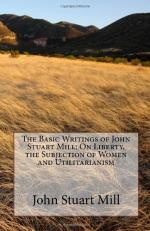|
This section contains 8,829 words (approx. 30 pages at 300 words per page) |

|
SOURCE: "J. S. Mill's Theory of Poetry," in University of Toronto Quarterly, Vol. XXIX, No. 4, 1960, pp. 420-38.
In the following essay, Robson argues that Mill's theory of poetry combined Utilitarian principles with certain aspects of Romanticism by asserting that poetry advocates moral actions through an appeal to the emotions.
John Stuart Mill is often held up to scorn as a cold, mechanical thinker for whom ethics is no more than logic, and politics no more than political economy. Swathed in mournful black, hard-visaged and iceveined, Mill stands for the Victorian virtues to which we (thank heaven) cannot pretend. The picture is patently a caricature, failing to do justice to the man or to his thought, but correcting it seems difficult. Mill is himself mainly responsible for the difficulty, his Autobiography being little more than the history of his education and opinions. His first biographer, Bain, was plus royalist...
|
This section contains 8,829 words (approx. 30 pages at 300 words per page) |

|


